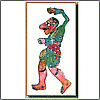Wealth was for the Greeks a minor deity associated especially with agricultural produce. In Aristophanes' play however, the figure of Wealth personifies not only goods in kind but also money, which is in a sense abstract. Aristophanes' personification admirably shows the way money has (as Marx and many others have noted) of seeming to acquire a powerful life of its own, as if it is a person rather than a thing. But in contrast to the pessimistic view that money is essentially evil, comic optimism attributes the prosperity of the wicked, and the poverty of the righteous, to curable conditions - the blindness of Wealth and his ignorance of his own immense power. It is the poor citizen Chremylos who has the intelligence to describe this power to him, and who has him cured of blindness. The effect, again, is democratic demystification of money.
Whereas wealth includes all good things, money is a single thing - abstract power to command goods and services from others. Hence the differences, brilliantly described by Chremylos, between money and goods in kind: money is a universal means and a universal end, overturns other values (even religion), and inspires unlimited desire. Hence also the logical impossibility, brilliantly described by Poverty, of everyone having a lot of money: who will be left to provide the goods and services?
But Poverty is chased out, and the disruptive power of her arguments is neutralised by the happy outcome of the plot. For it is not in fact everyone who benefits from Wealth’s ability to see (the Informer is excluded). The new wealth is described (by Karion) mainly in terms of goods rather than money. And in keeping with the origins of comedy in ritual designed to create abundance for all, Wealth is finally escorted to the civic treasury in the Parthenon.
Aristophanes paints a world in which excesses of fantasy are inseparable from sharp and profound criticisms of social conditions. The elements of fantasy, such as the personification of money, the visits of impoverished gods and the existence of boundless wealth are more vividly portrayed through puppetry than by naturalistic performance. We thus drew on Karaghiozi—a form of shadow puppet theatre which arrived in Greece from Turkey in the 19th century—because it focuses on 'types' and suggests illusion in a way reminiscent of Old Comedy.
Though Karaghiozi shares the characteristics with other forms of puppetry, he also embodies a Greek spirit struggling for survival. Hunger is as prevalent in the world of Karaghiozi as in Aristophanes' Wealth. What emerges from hunger and poverty are tricks and stratagems to alleviate them and also fantasies about a world without hunger and a world without the anxieties associated with the distribution of wealth.
|
